Diploma of Automotive Management: AURAMA4005 Customer Issues
VerifiedAdded on 2022/10/11
|51
|14319
|10
Homework Assignment
AI Summary
This workbook, designed for the Sheffield College Diploma of Automotive Management, focuses on the unit AURAMA4005: Manage Complex Customer Issues in an automotive Workshop. It covers essential aspects of customer complaint management, emphasizing the importance of effective communication, informed judgment, and adherence to complaint handling policies. The workbook includes sections on examining the nature of issues, exercising judgment in resolving them, and documenting outcomes. It also provides a sample complaint handling policy and observation checklists. The assignment stresses the value of complaints as opportunities for improvement, detailing the benefits of well-managed complaints, and the importance of staff commitment and management responsibility in fostering a positive complaint-handling culture. The document explores principles like fairness, accessibility, responsiveness, efficiency, and integration in complaint handling systems, emphasizing the need for impartial investigations, transparency, and confidentiality. It also highlights the significance of resources, including electronic systems for tracking and analyzing complaints, and compliance with record-keeping practices and relevant legislation.
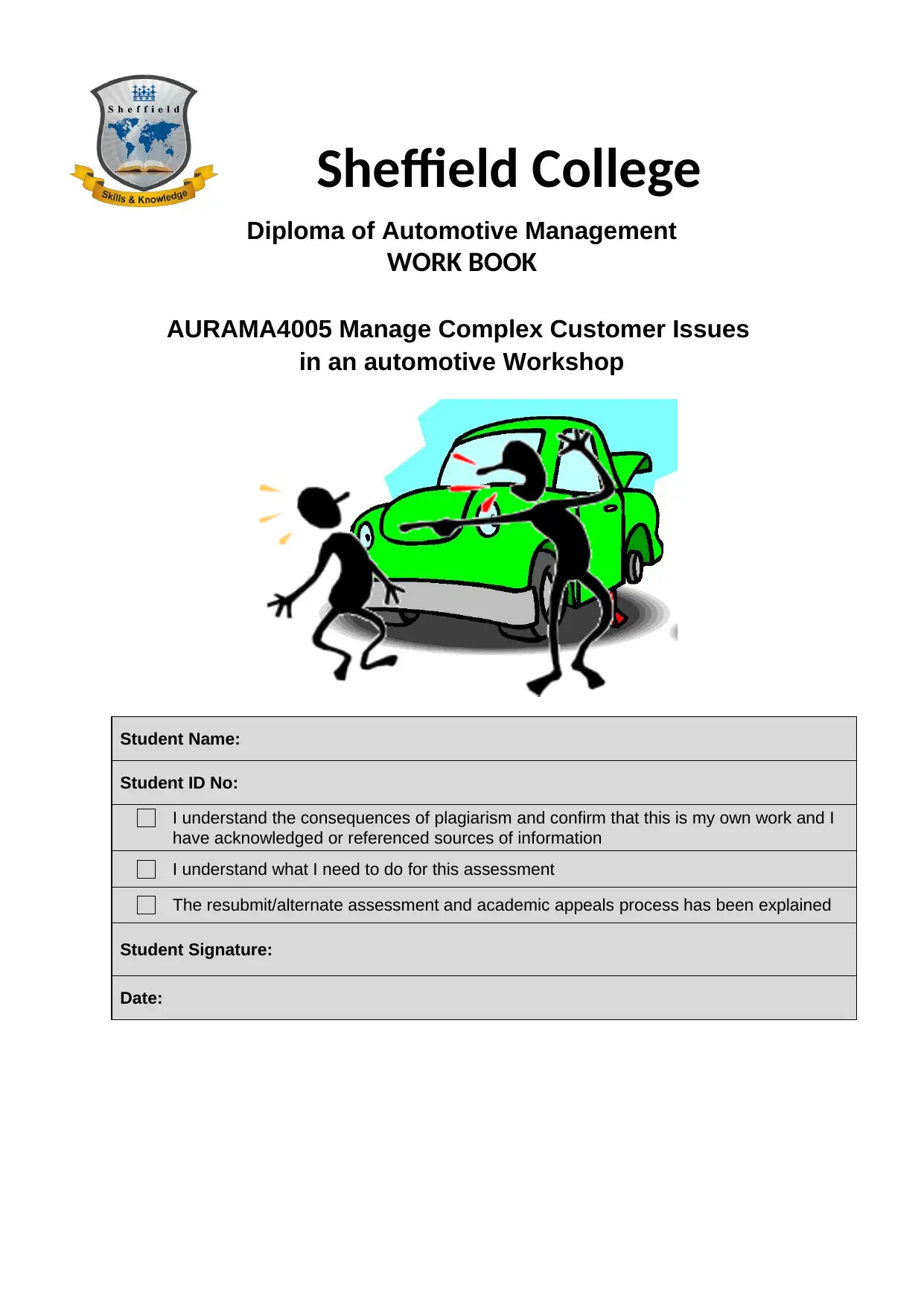
Sheffield College
Diploma of Automotive Management
WORK BOOK
AURAMA4005 Manage Complex Customer Issues
in an automotive Workshop
Student Name:
Student ID No:
I understand the consequences of plagiarism and confirm that this is my own work and I
have acknowledged or referenced sources of information
I understand what I need to do for this assessment
The resubmit/alternate assessment and academic appeals process has been explained
Student Signature:
Date:
Diploma of Automotive Management
WORK BOOK
AURAMA4005 Manage Complex Customer Issues
in an automotive Workshop
Student Name:
Student ID No:
I understand the consequences of plagiarism and confirm that this is my own work and I
have acknowledged or referenced sources of information
I understand what I need to do for this assessment
The resubmit/alternate assessment and academic appeals process has been explained
Student Signature:
Date:
Paraphrase This Document
Need a fresh take? Get an instant paraphrase of this document with our AI Paraphraser
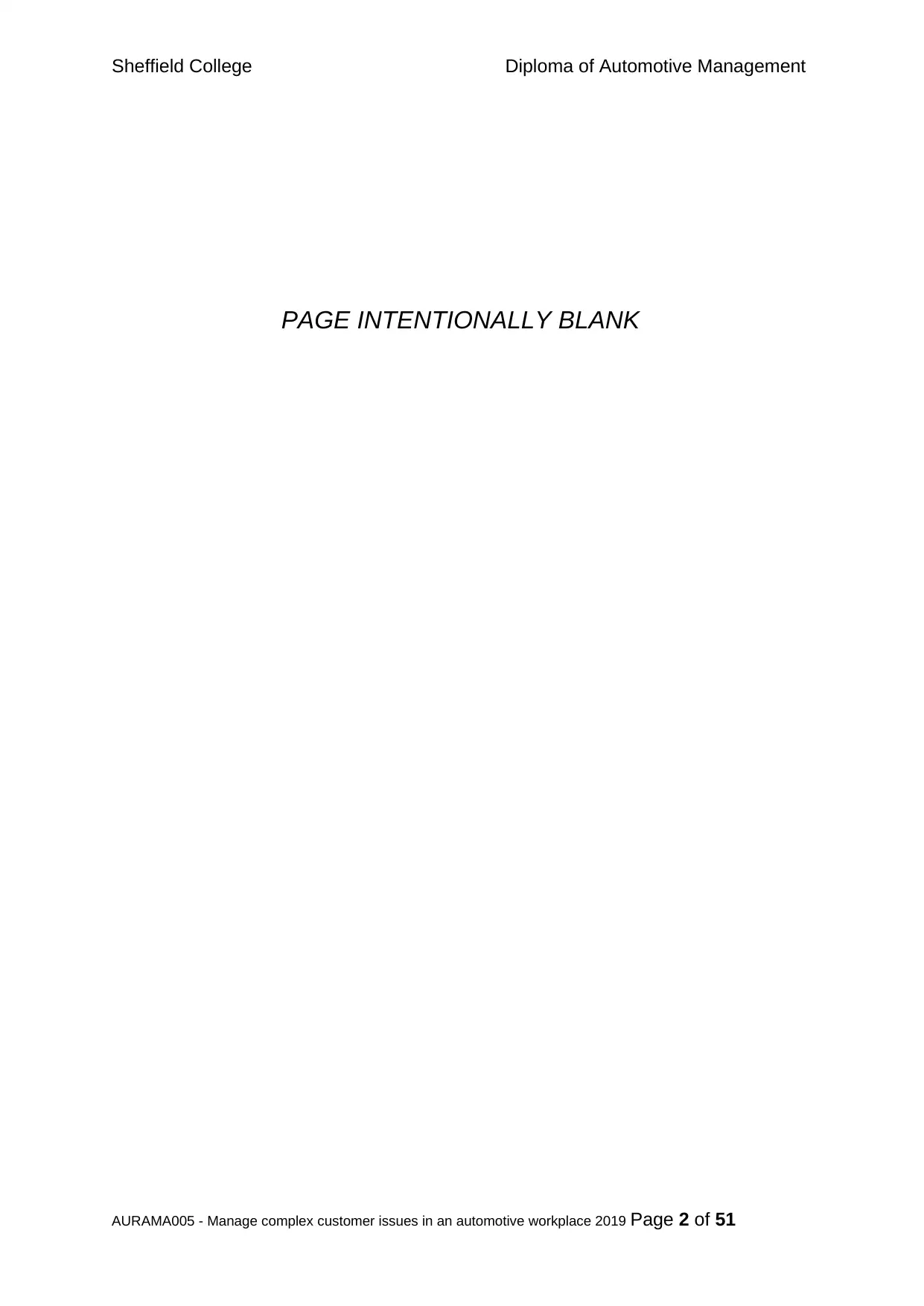
Sheffield College Diploma of Automotive Management
PAGE INTENTIONALLY BLANK
AURAMA005 - Manage complex customer issues in an automotive workplace 2019 Page 2 of 51
PAGE INTENTIONALLY BLANK
AURAMA005 - Manage complex customer issues in an automotive workplace 2019 Page 2 of 51
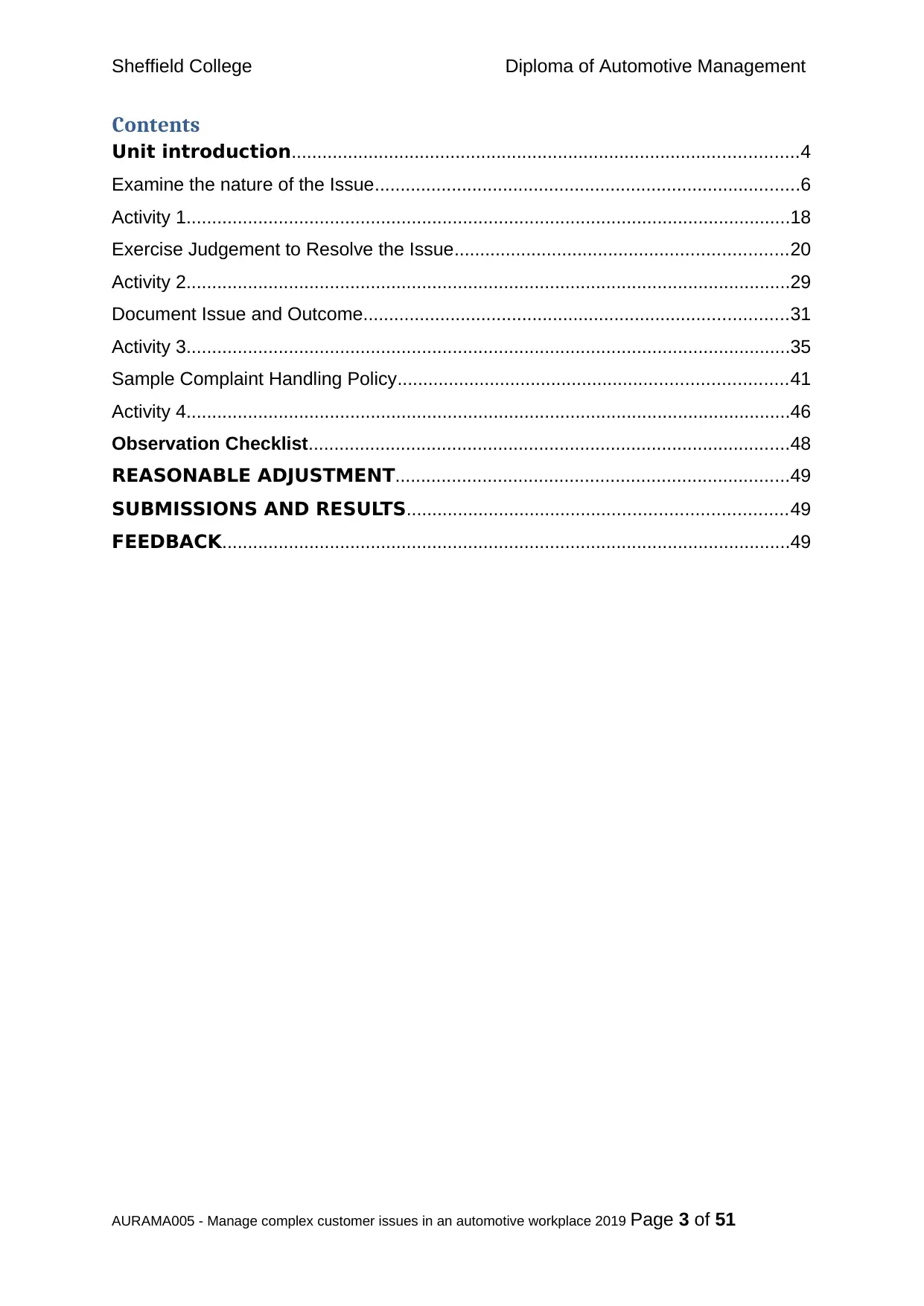
Sheffield College Diploma of Automotive Management
Contents
Unit introduction...................................................................................................4
Examine the nature of the Issue...................................................................................6
Activity 1......................................................................................................................18
Exercise Judgement to Resolve the Issue.................................................................20
Activity 2......................................................................................................................29
Document Issue and Outcome...................................................................................31
Activity 3......................................................................................................................35
Sample Complaint Handling Policy............................................................................41
Activity 4......................................................................................................................46
Observation Checklist..............................................................................................48
REASONABLE ADJUSTMENT.............................................................................49
SUBMISSIONS AND RESULTS..........................................................................49
FEEDBACK...............................................................................................................49
AURAMA005 - Manage complex customer issues in an automotive workplace 2019 Page 3 of 51
Contents
Unit introduction...................................................................................................4
Examine the nature of the Issue...................................................................................6
Activity 1......................................................................................................................18
Exercise Judgement to Resolve the Issue.................................................................20
Activity 2......................................................................................................................29
Document Issue and Outcome...................................................................................31
Activity 3......................................................................................................................35
Sample Complaint Handling Policy............................................................................41
Activity 4......................................................................................................................46
Observation Checklist..............................................................................................48
REASONABLE ADJUSTMENT.............................................................................49
SUBMISSIONS AND RESULTS..........................................................................49
FEEDBACK...............................................................................................................49
AURAMA005 - Manage complex customer issues in an automotive workplace 2019 Page 3 of 51
⊘ This is a preview!⊘
Do you want full access?
Subscribe today to unlock all pages.

Trusted by 1+ million students worldwide
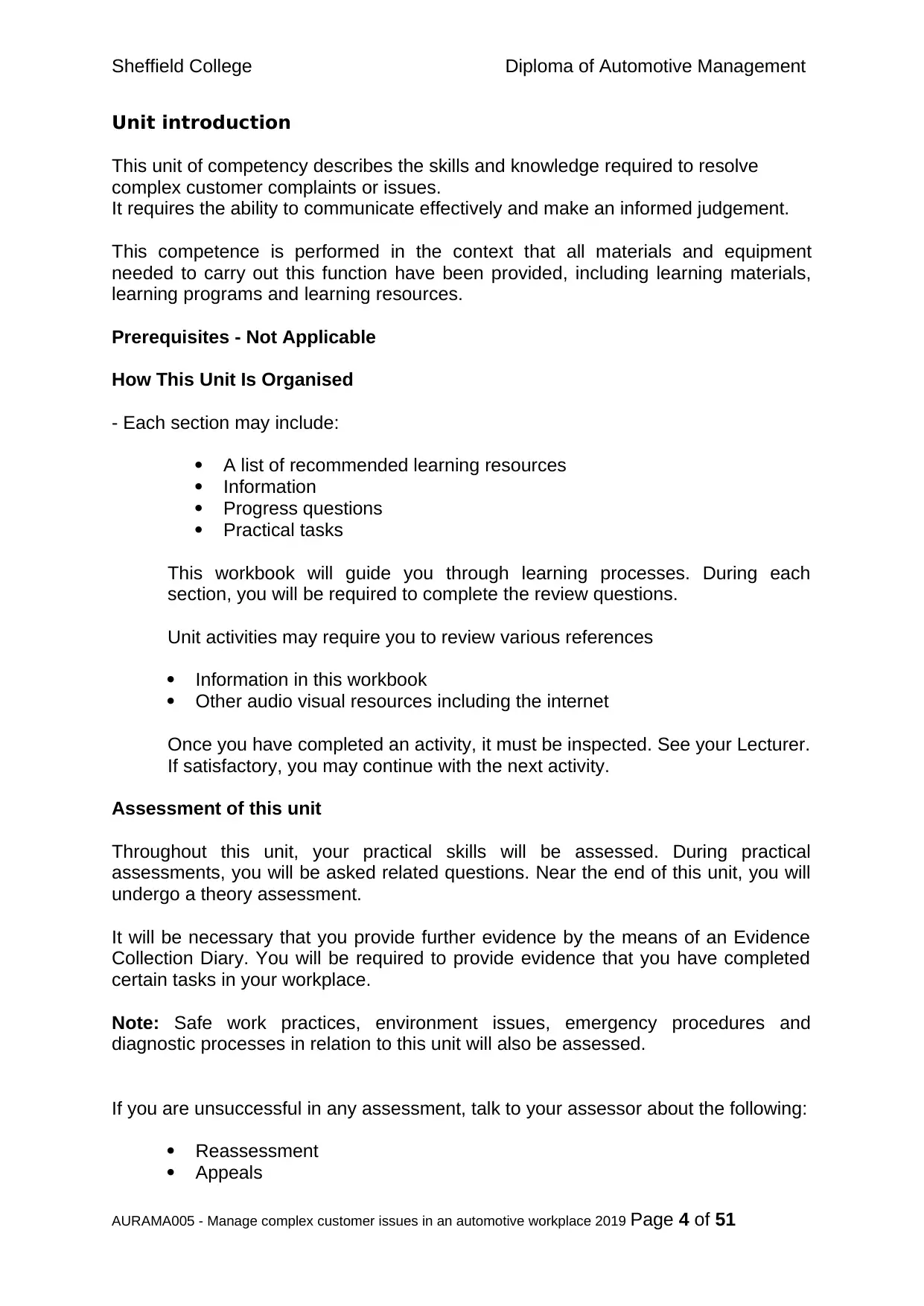
Sheffield College Diploma of Automotive Management
Unit introduction
This unit of competency describes the skills and knowledge required to resolve
complex customer complaints or issues.
It requires the ability to communicate effectively and make an informed judgement.
This competence is performed in the context that all materials and equipment
needed to carry out this function have been provided, including learning materials,
learning programs and learning resources.
Prerequisites - Not Applicable
How This Unit Is Organised
- Each section may include:
A list of recommended learning resources
Information
Progress questions
Practical tasks
This workbook will guide you through learning processes. During each
section, you will be required to complete the review questions.
Unit activities may require you to review various references
Information in this workbook
Other audio visual resources including the internet
Once you have completed an activity, it must be inspected. See your Lecturer.
If satisfactory, you may continue with the next activity.
Assessment of this unit
Throughout this unit, your practical skills will be assessed. During practical
assessments, you will be asked related questions. Near the end of this unit, you will
undergo a theory assessment.
It will be necessary that you provide further evidence by the means of an Evidence
Collection Diary. You will be required to provide evidence that you have completed
certain tasks in your workplace.
Note: Safe work practices, environment issues, emergency procedures and
diagnostic processes in relation to this unit will also be assessed.
If you are unsuccessful in any assessment, talk to your assessor about the following:
Reassessment
Appeals
AURAMA005 - Manage complex customer issues in an automotive workplace 2019 Page 4 of 51
Unit introduction
This unit of competency describes the skills and knowledge required to resolve
complex customer complaints or issues.
It requires the ability to communicate effectively and make an informed judgement.
This competence is performed in the context that all materials and equipment
needed to carry out this function have been provided, including learning materials,
learning programs and learning resources.
Prerequisites - Not Applicable
How This Unit Is Organised
- Each section may include:
A list of recommended learning resources
Information
Progress questions
Practical tasks
This workbook will guide you through learning processes. During each
section, you will be required to complete the review questions.
Unit activities may require you to review various references
Information in this workbook
Other audio visual resources including the internet
Once you have completed an activity, it must be inspected. See your Lecturer.
If satisfactory, you may continue with the next activity.
Assessment of this unit
Throughout this unit, your practical skills will be assessed. During practical
assessments, you will be asked related questions. Near the end of this unit, you will
undergo a theory assessment.
It will be necessary that you provide further evidence by the means of an Evidence
Collection Diary. You will be required to provide evidence that you have completed
certain tasks in your workplace.
Note: Safe work practices, environment issues, emergency procedures and
diagnostic processes in relation to this unit will also be assessed.
If you are unsuccessful in any assessment, talk to your assessor about the following:
Reassessment
Appeals
AURAMA005 - Manage complex customer issues in an automotive workplace 2019 Page 4 of 51
Paraphrase This Document
Need a fresh take? Get an instant paraphrase of this document with our AI Paraphraser
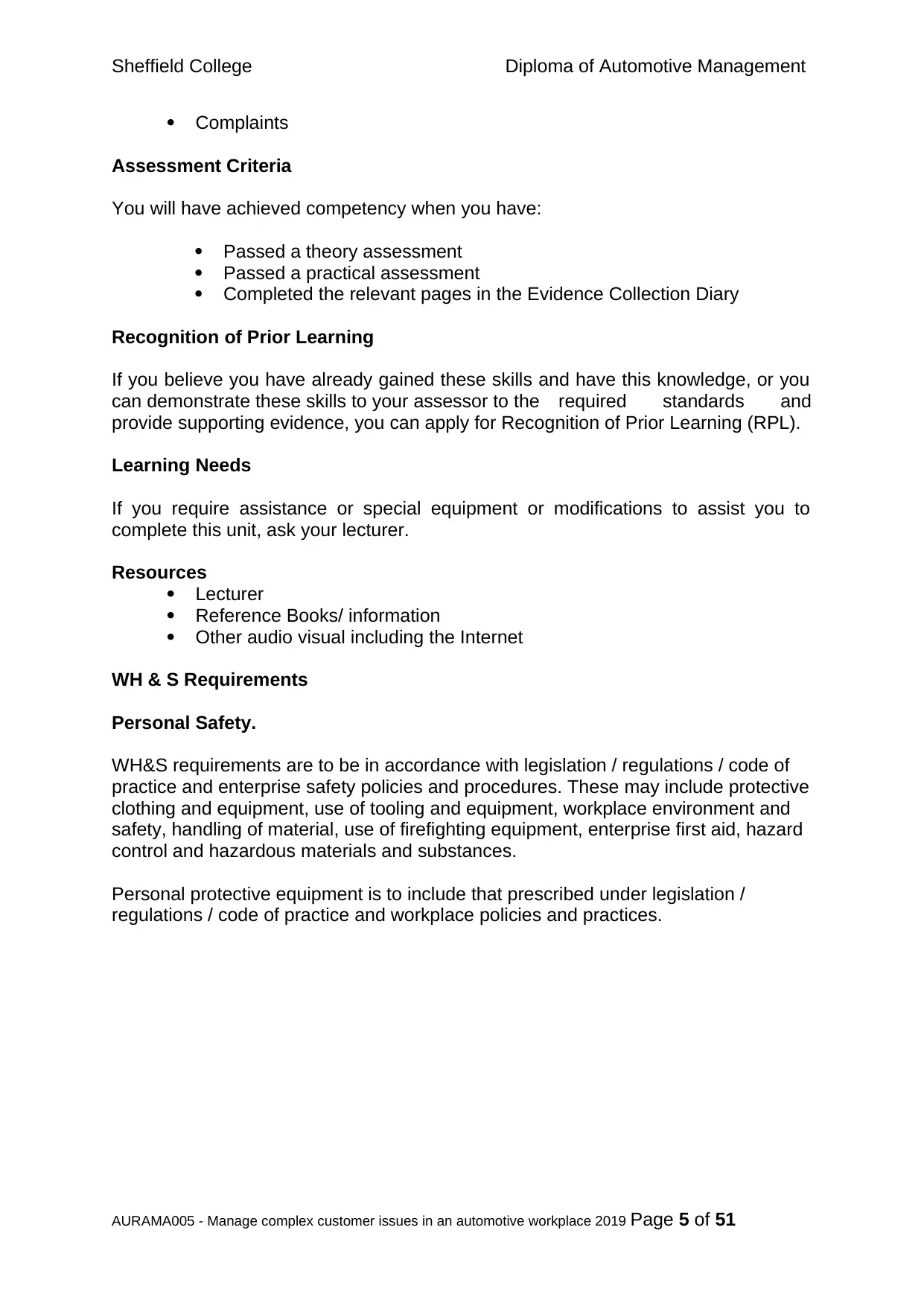
Sheffield College Diploma of Automotive Management
Complaints
Assessment Criteria
You will have achieved competency when you have:
Passed a theory assessment
Passed a practical assessment
Completed the relevant pages in the Evidence Collection Diary
Recognition of Prior Learning
If you believe you have already gained these skills and have this knowledge, or you
can demonstrate these skills to your assessor to the required standards and
provide supporting evidence, you can apply for Recognition of Prior Learning (RPL).
Learning Needs
If you require assistance or special equipment or modifications to assist you to
complete this unit, ask your lecturer.
Resources
Lecturer
Reference Books/ information
Other audio visual including the Internet
WH & S Requirements
Personal Safety.
WH&S requirements are to be in accordance with legislation / regulations / code of
practice and enterprise safety policies and procedures. These may include protective
clothing and equipment, use of tooling and equipment, workplace environment and
safety, handling of material, use of firefighting equipment, enterprise first aid, hazard
control and hazardous materials and substances.
Personal protective equipment is to include that prescribed under legislation /
regulations / code of practice and workplace policies and practices.
AURAMA005 - Manage complex customer issues in an automotive workplace 2019 Page 5 of 51
Complaints
Assessment Criteria
You will have achieved competency when you have:
Passed a theory assessment
Passed a practical assessment
Completed the relevant pages in the Evidence Collection Diary
Recognition of Prior Learning
If you believe you have already gained these skills and have this knowledge, or you
can demonstrate these skills to your assessor to the required standards and
provide supporting evidence, you can apply for Recognition of Prior Learning (RPL).
Learning Needs
If you require assistance or special equipment or modifications to assist you to
complete this unit, ask your lecturer.
Resources
Lecturer
Reference Books/ information
Other audio visual including the Internet
WH & S Requirements
Personal Safety.
WH&S requirements are to be in accordance with legislation / regulations / code of
practice and enterprise safety policies and procedures. These may include protective
clothing and equipment, use of tooling and equipment, workplace environment and
safety, handling of material, use of firefighting equipment, enterprise first aid, hazard
control and hazardous materials and substances.
Personal protective equipment is to include that prescribed under legislation /
regulations / code of practice and workplace policies and practices.
AURAMA005 - Manage complex customer issues in an automotive workplace 2019 Page 5 of 51
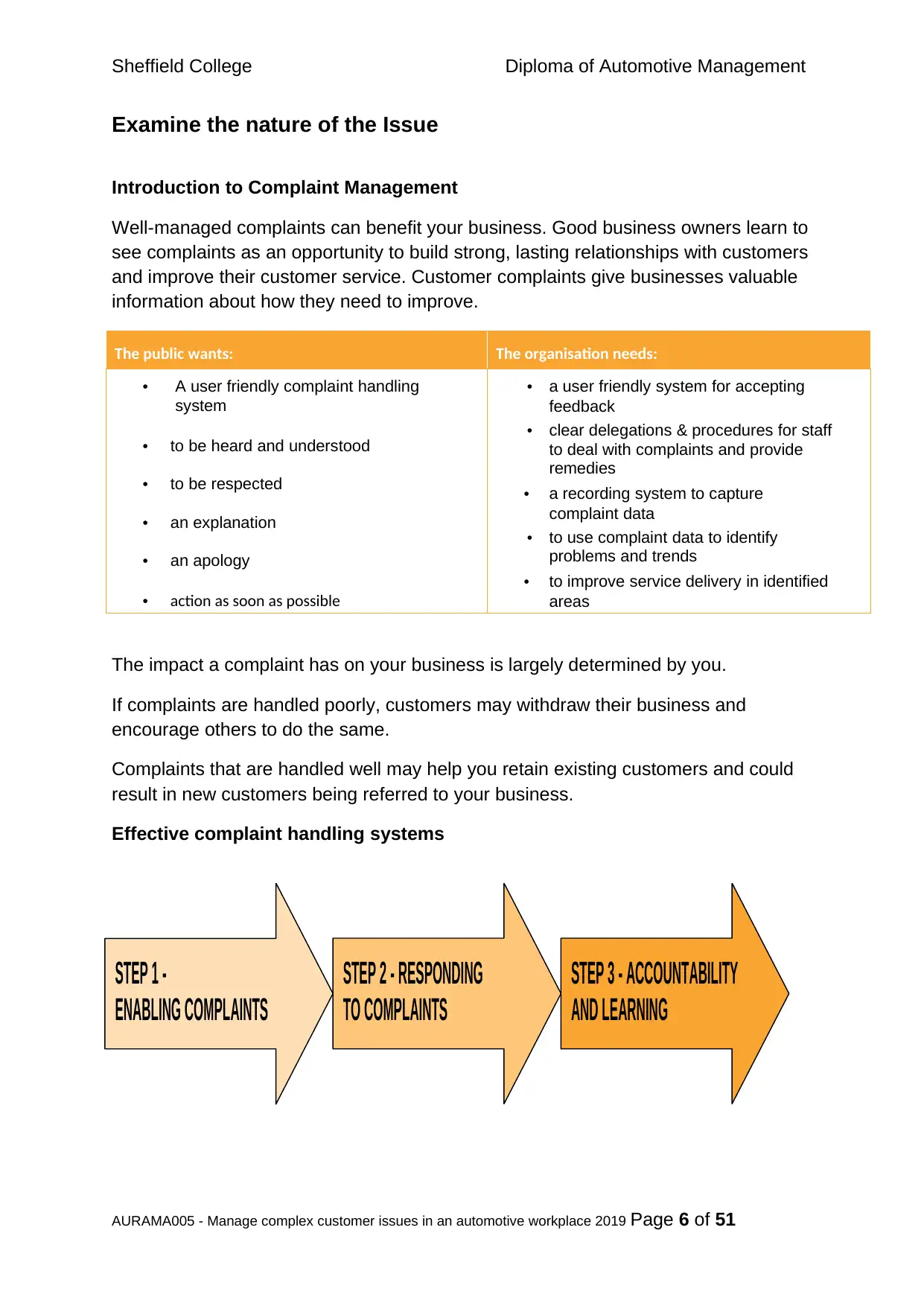
Sheffield College Diploma of Automotive Management
Examine the nature of the Issue
Introduction to Complaint Management
Well-managed complaints can benefit your business. Good business owners learn to
see complaints as an opportunity to build strong, lasting relationships with customers
and improve their customer service. Customer complaints give businesses valuable
information about how they need to improve.
The public wants: The organisation needs:
• A user friendly complaint handling
system
• to be heard and understood
• to be respected
• an explanation
• an apology
• action as soon as possible
• a user friendly system for accepting
feedback
• clear delegations & procedures for staff
to deal with complaints and provide
remedies
• a recording system to capture
complaint data
• to use complaint data to identify
problems and trends
• to improve service delivery in identified
areas
The impact a complaint has on your business is largely determined by you.
If complaints are handled poorly, customers may withdraw their business and
encourage others to do the same.
Complaints that are handled well may help you retain existing customers and could
result in new customers being referred to your business.
Effective complaint handling systems
AURAMA005 - Manage complex customer issues in an automotive workplace 2019 Page 6 of 51
STEP 1 -
ENABLING COMPLAINTS
STEP 2 - RESPONDING
TO COMPLAINTS
STEP 3 - ACCOUNTABILITY
AND LEARNING
Examine the nature of the Issue
Introduction to Complaint Management
Well-managed complaints can benefit your business. Good business owners learn to
see complaints as an opportunity to build strong, lasting relationships with customers
and improve their customer service. Customer complaints give businesses valuable
information about how they need to improve.
The public wants: The organisation needs:
• A user friendly complaint handling
system
• to be heard and understood
• to be respected
• an explanation
• an apology
• action as soon as possible
• a user friendly system for accepting
feedback
• clear delegations & procedures for staff
to deal with complaints and provide
remedies
• a recording system to capture
complaint data
• to use complaint data to identify
problems and trends
• to improve service delivery in identified
areas
The impact a complaint has on your business is largely determined by you.
If complaints are handled poorly, customers may withdraw their business and
encourage others to do the same.
Complaints that are handled well may help you retain existing customers and could
result in new customers being referred to your business.
Effective complaint handling systems
AURAMA005 - Manage complex customer issues in an automotive workplace 2019 Page 6 of 51
STEP 1 -
ENABLING COMPLAINTS
STEP 2 - RESPONDING
TO COMPLAINTS
STEP 3 - ACCOUNTABILITY
AND LEARNING
⊘ This is a preview!⊘
Do you want full access?
Subscribe today to unlock all pages.

Trusted by 1+ million students worldwide
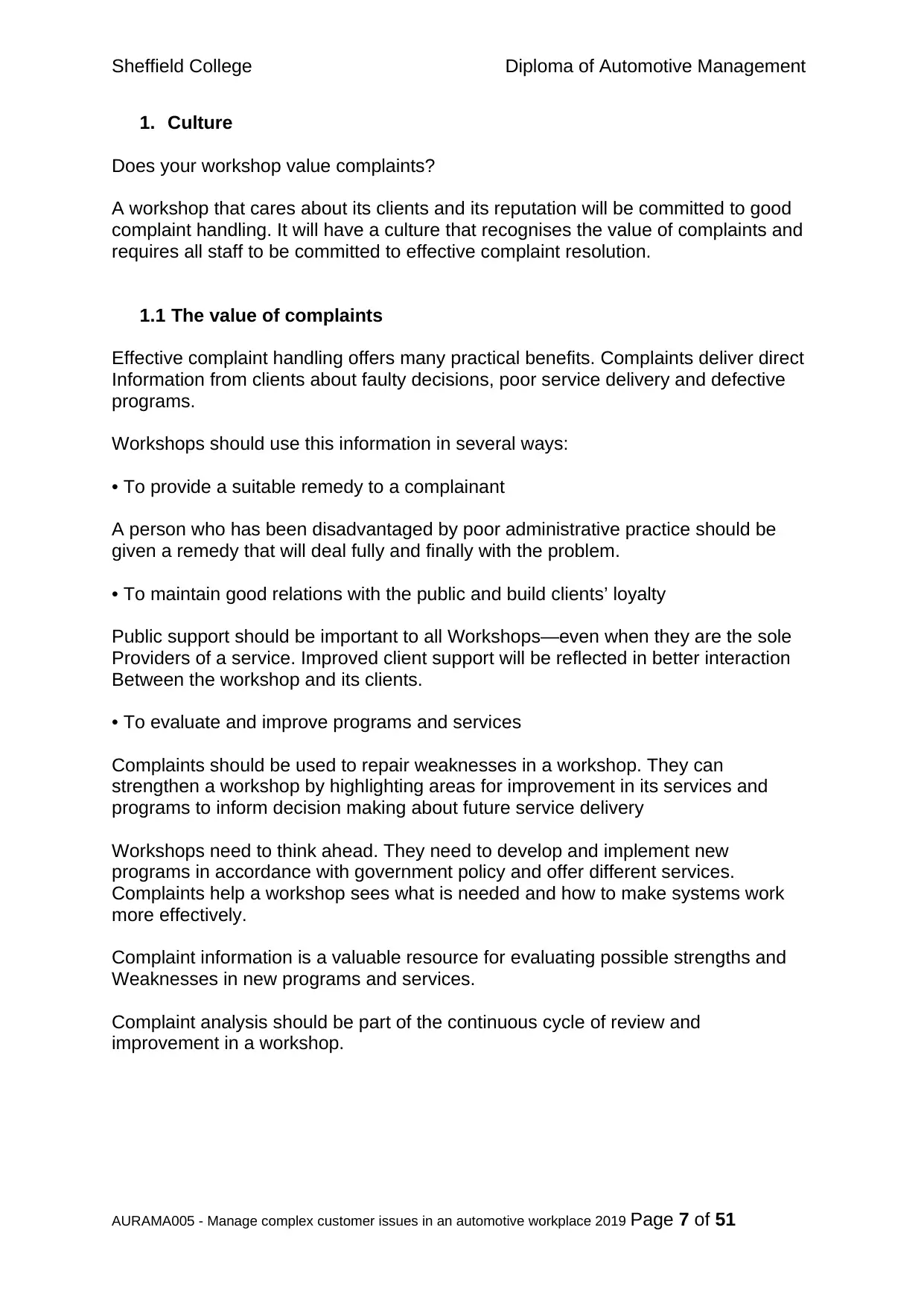
Sheffield College Diploma of Automotive Management
1. Culture
Does your workshop value complaints?
A workshop that cares about its clients and its reputation will be committed to good
complaint handling. It will have a culture that recognises the value of complaints and
requires all staff to be committed to effective complaint resolution.
1.1 The value of complaints
Effective complaint handling offers many practical benefits. Complaints deliver direct
Information from clients about faulty decisions, poor service delivery and defective
programs.
Workshops should use this information in several ways:
• To provide a suitable remedy to a complainant
A person who has been disadvantaged by poor administrative practice should be
given a remedy that will deal fully and finally with the problem.
• To maintain good relations with the public and build clients’ loyalty
Public support should be important to all Workshops—even when they are the sole
Providers of a service. Improved client support will be reflected in better interaction
Between the workshop and its clients.
• To evaluate and improve programs and services
Complaints should be used to repair weaknesses in a workshop. They can
strengthen a workshop by highlighting areas for improvement in its services and
programs to inform decision making about future service delivery
Workshops need to think ahead. They need to develop and implement new
programs in accordance with government policy and offer different services.
Complaints help a workshop sees what is needed and how to make systems work
more effectively.
Complaint information is a valuable resource for evaluating possible strengths and
Weaknesses in new programs and services.
Complaint analysis should be part of the continuous cycle of review and
improvement in a workshop.
AURAMA005 - Manage complex customer issues in an automotive workplace 2019 Page 7 of 51
1. Culture
Does your workshop value complaints?
A workshop that cares about its clients and its reputation will be committed to good
complaint handling. It will have a culture that recognises the value of complaints and
requires all staff to be committed to effective complaint resolution.
1.1 The value of complaints
Effective complaint handling offers many practical benefits. Complaints deliver direct
Information from clients about faulty decisions, poor service delivery and defective
programs.
Workshops should use this information in several ways:
• To provide a suitable remedy to a complainant
A person who has been disadvantaged by poor administrative practice should be
given a remedy that will deal fully and finally with the problem.
• To maintain good relations with the public and build clients’ loyalty
Public support should be important to all Workshops—even when they are the sole
Providers of a service. Improved client support will be reflected in better interaction
Between the workshop and its clients.
• To evaluate and improve programs and services
Complaints should be used to repair weaknesses in a workshop. They can
strengthen a workshop by highlighting areas for improvement in its services and
programs to inform decision making about future service delivery
Workshops need to think ahead. They need to develop and implement new
programs in accordance with government policy and offer different services.
Complaints help a workshop sees what is needed and how to make systems work
more effectively.
Complaint information is a valuable resource for evaluating possible strengths and
Weaknesses in new programs and services.
Complaint analysis should be part of the continuous cycle of review and
improvement in a workshop.
AURAMA005 - Manage complex customer issues in an automotive workplace 2019 Page 7 of 51
Paraphrase This Document
Need a fresh take? Get an instant paraphrase of this document with our AI Paraphraser
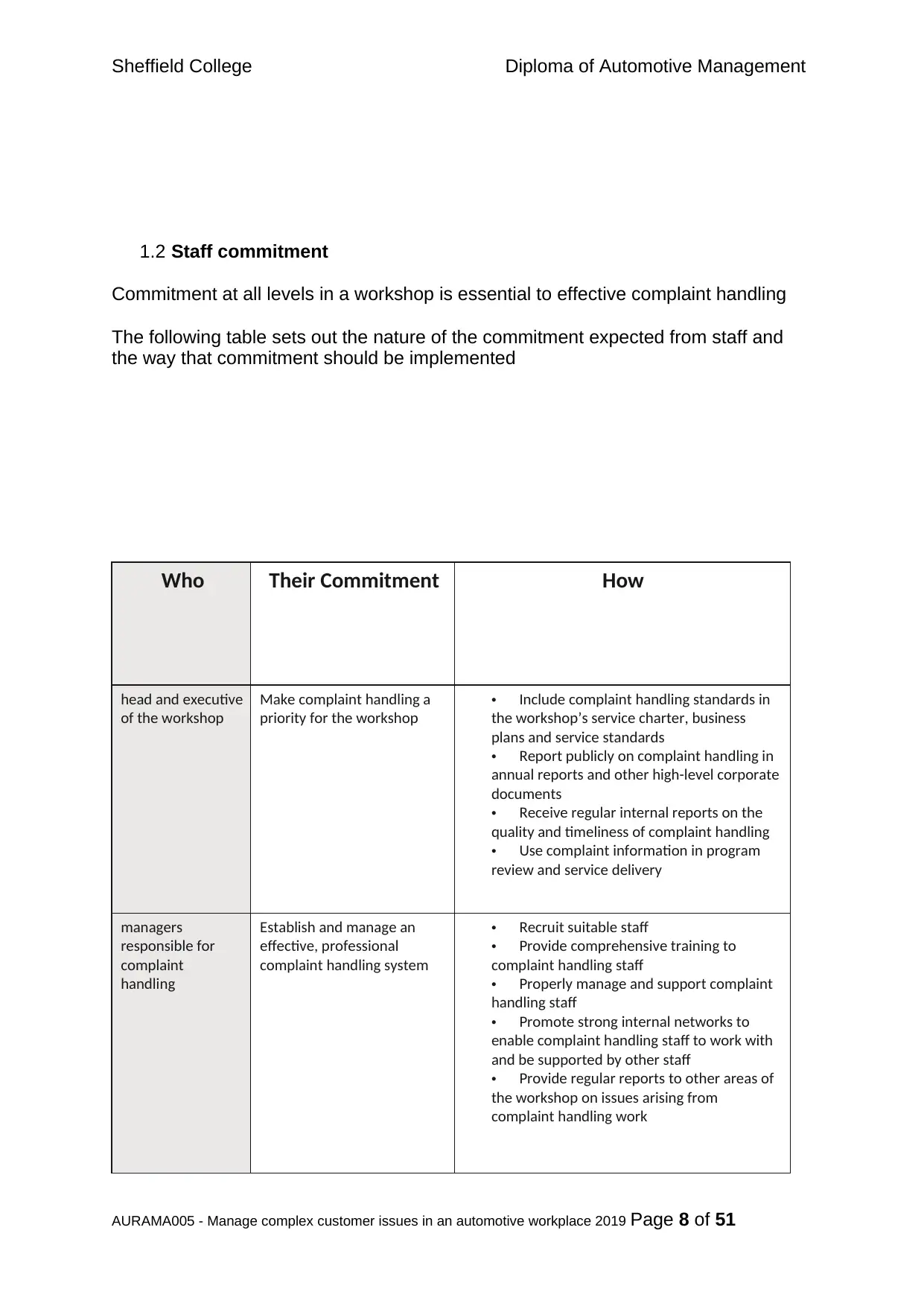
Sheffield College Diploma of Automotive Management
1.2 Staff commitment
Commitment at all levels in a workshop is essential to effective complaint handling
The following table sets out the nature of the commitment expected from staff and
the way that commitment should be implemented
Who Their Commitment How
head and executive
of the workshop
Make complaint handling a
priority for the workshop
• Include complaint handling standards in
the workshop’s service charter, business
plans and service standards
• Report publicly on complaint handling in
annual reports and other high-level corporate
documents
• Receive regular internal reports on the
quality and timeliness of complaint handling
• Use complaint information in program
review and service delivery
managers
responsible for
complaint
handling
Establish and manage an
effective, professional
complaint handling system
• Recruit suitable staff
• Provide comprehensive training to
complaint handling staff
• Properly manage and support complaint
handling staff
• Promote strong internal networks to
enable complaint handling staff to work with
and be supported by other staff
• Provide regular reports to other areas of
the workshop on issues arising from
complaint handling work
AURAMA005 - Manage complex customer issues in an automotive workplace 2019 Page 8 of 51
1.2 Staff commitment
Commitment at all levels in a workshop is essential to effective complaint handling
The following table sets out the nature of the commitment expected from staff and
the way that commitment should be implemented
Who Their Commitment How
head and executive
of the workshop
Make complaint handling a
priority for the workshop
• Include complaint handling standards in
the workshop’s service charter, business
plans and service standards
• Report publicly on complaint handling in
annual reports and other high-level corporate
documents
• Receive regular internal reports on the
quality and timeliness of complaint handling
• Use complaint information in program
review and service delivery
managers
responsible for
complaint
handling
Establish and manage an
effective, professional
complaint handling system
• Recruit suitable staff
• Provide comprehensive training to
complaint handling staff
• Properly manage and support complaint
handling staff
• Promote strong internal networks to
enable complaint handling staff to work with
and be supported by other staff
• Provide regular reports to other areas of
the workshop on issues arising from
complaint handling work
AURAMA005 - Manage complex customer issues in an automotive workplace 2019 Page 8 of 51
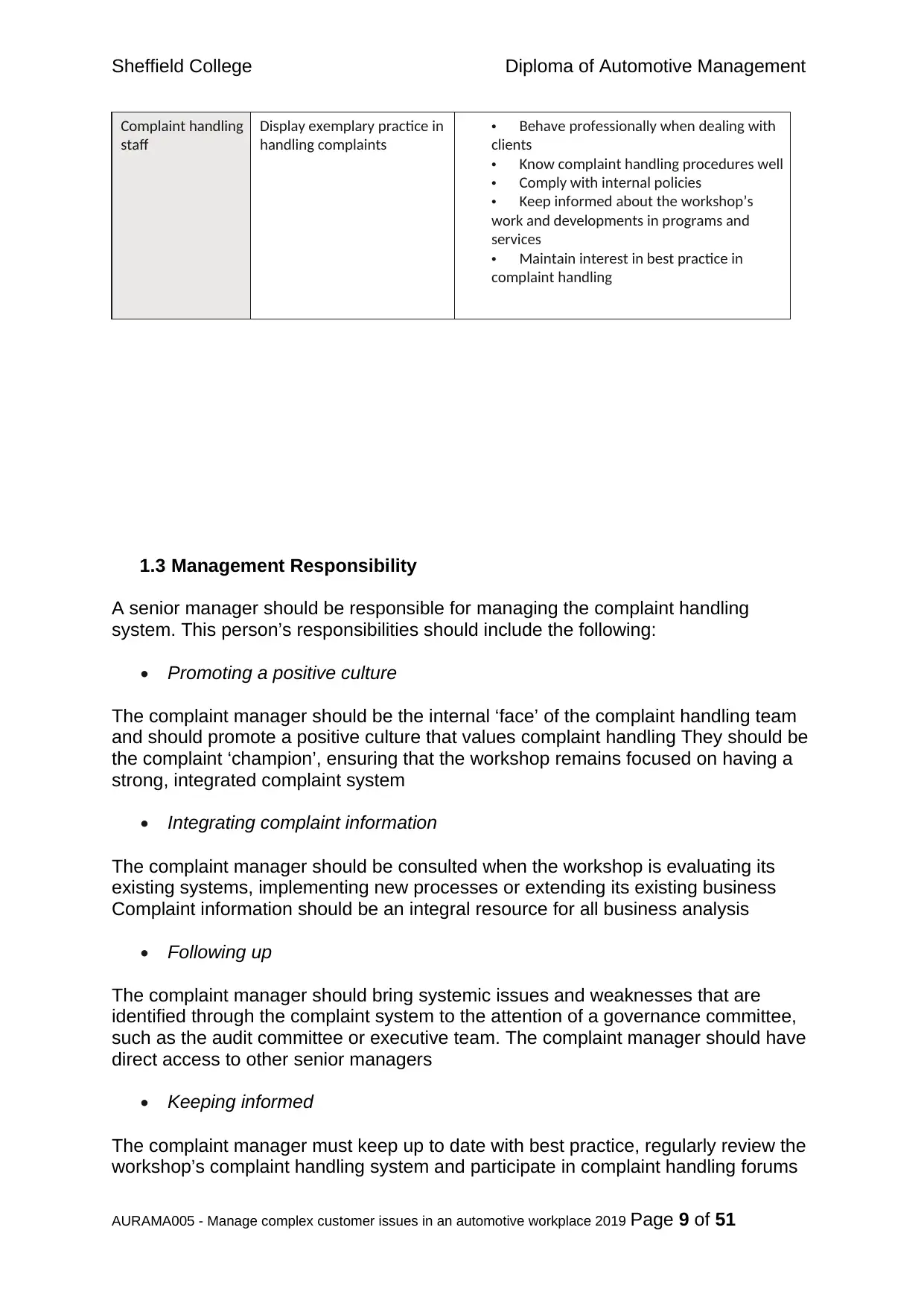
Sheffield College Diploma of Automotive Management
Complaint handling
staff
Display exemplary practice in
handling complaints
• Behave professionally when dealing with
clients
• Know complaint handling procedures well
• Comply with internal policies
• Keep informed about the workshop’s
work and developments in programs and
services
• Maintain interest in best practice in
complaint handling
1.3 Management Responsibility
A senior manager should be responsible for managing the complaint handling
system. This person’s responsibilities should include the following:
• Promoting a positive culture
The complaint manager should be the internal ‘face’ of the complaint handling team
and should promote a positive culture that values complaint handling They should be
the complaint ‘champion’, ensuring that the workshop remains focused on having a
strong, integrated complaint system
• Integrating complaint information
The complaint manager should be consulted when the workshop is evaluating its
existing systems, implementing new processes or extending its existing business
Complaint information should be an integral resource for all business analysis
• Following up
The complaint manager should bring systemic issues and weaknesses that are
identified through the complaint system to the attention of a governance committee,
such as the audit committee or executive team. The complaint manager should have
direct access to other senior managers
• Keeping informed
The complaint manager must keep up to date with best practice, regularly review the
workshop’s complaint handling system and participate in complaint handling forums
AURAMA005 - Manage complex customer issues in an automotive workplace 2019 Page 9 of 51
Complaint handling
staff
Display exemplary practice in
handling complaints
• Behave professionally when dealing with
clients
• Know complaint handling procedures well
• Comply with internal policies
• Keep informed about the workshop’s
work and developments in programs and
services
• Maintain interest in best practice in
complaint handling
1.3 Management Responsibility
A senior manager should be responsible for managing the complaint handling
system. This person’s responsibilities should include the following:
• Promoting a positive culture
The complaint manager should be the internal ‘face’ of the complaint handling team
and should promote a positive culture that values complaint handling They should be
the complaint ‘champion’, ensuring that the workshop remains focused on having a
strong, integrated complaint system
• Integrating complaint information
The complaint manager should be consulted when the workshop is evaluating its
existing systems, implementing new processes or extending its existing business
Complaint information should be an integral resource for all business analysis
• Following up
The complaint manager should bring systemic issues and weaknesses that are
identified through the complaint system to the attention of a governance committee,
such as the audit committee or executive team. The complaint manager should have
direct access to other senior managers
• Keeping informed
The complaint manager must keep up to date with best practice, regularly review the
workshop’s complaint handling system and participate in complaint handling forums
AURAMA005 - Manage complex customer issues in an automotive workplace 2019 Page 9 of 51
⊘ This is a preview!⊘
Do you want full access?
Subscribe today to unlock all pages.

Trusted by 1+ million students worldwide
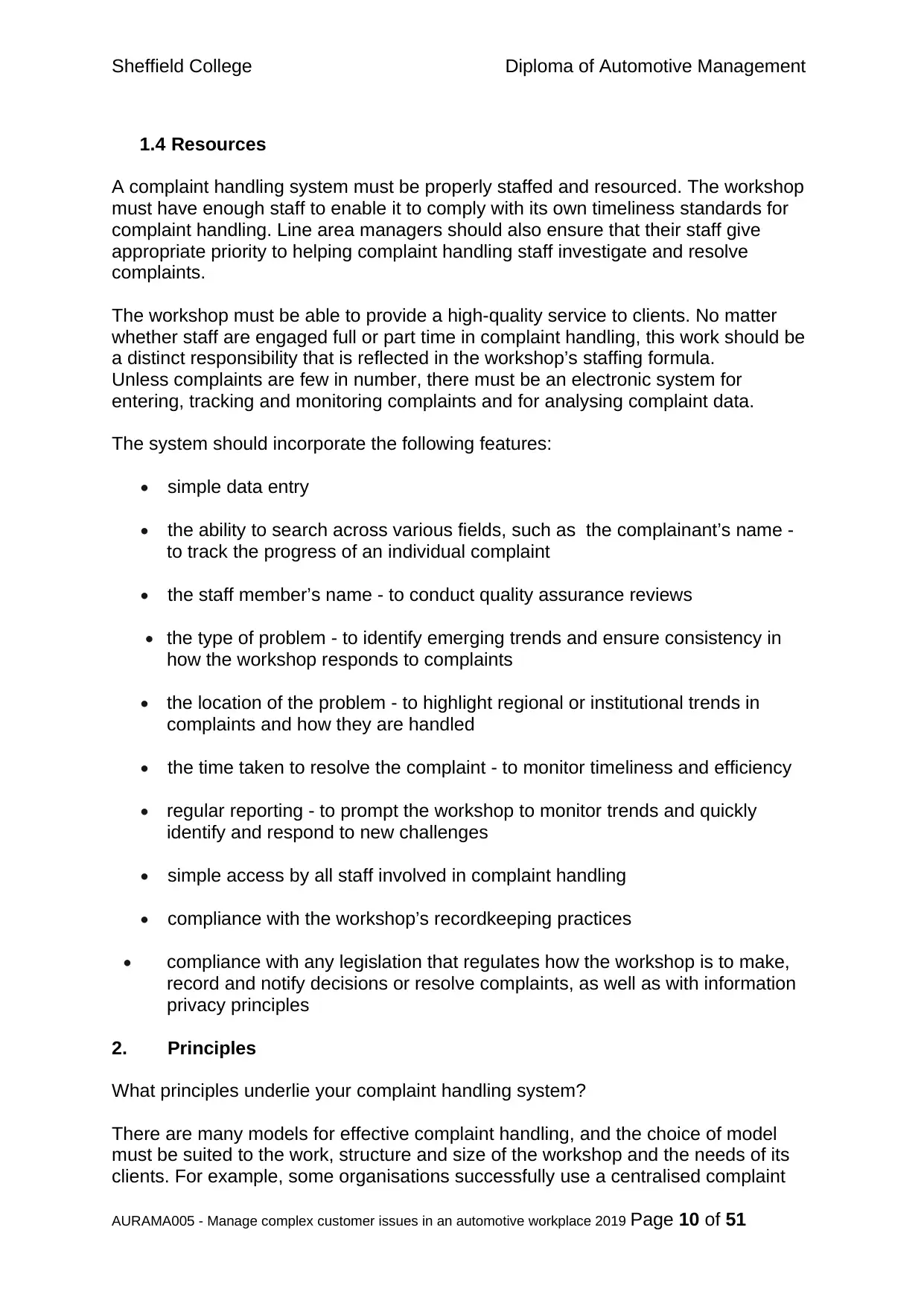
Sheffield College Diploma of Automotive Management
1.4 Resources
A complaint handling system must be properly staffed and resourced. The workshop
must have enough staff to enable it to comply with its own timeliness standards for
complaint handling. Line area managers should also ensure that their staff give
appropriate priority to helping complaint handling staff investigate and resolve
complaints.
The workshop must be able to provide a high-quality service to clients. No matter
whether staff are engaged full or part time in complaint handling, this work should be
a distinct responsibility that is reflected in the workshop’s staffing formula.
Unless complaints are few in number, there must be an electronic system for
entering, tracking and monitoring complaints and for analysing complaint data.
The system should incorporate the following features:
• simple data entry
• the ability to search across various fields, such as the complainant’s name -
to track the progress of an individual complaint
• the staff member’s name - to conduct quality assurance reviews
• the type of problem - to identify emerging trends and ensure consistency in
how the workshop responds to complaints
• the location of the problem - to highlight regional or institutional trends in
complaints and how they are handled
• the time taken to resolve the complaint - to monitor timeliness and efficiency
• regular reporting - to prompt the workshop to monitor trends and quickly
identify and respond to new challenges
• simple access by all staff involved in complaint handling
• compliance with the workshop’s recordkeeping practices
• compliance with any legislation that regulates how the workshop is to make,
record and notify decisions or resolve complaints, as well as with information
privacy principles
2. Principles
What principles underlie your complaint handling system?
There are many models for effective complaint handling, and the choice of model
must be suited to the work, structure and size of the workshop and the needs of its
clients. For example, some organisations successfully use a centralised complaint
AURAMA005 - Manage complex customer issues in an automotive workplace 2019 Page 10 of 51
1.4 Resources
A complaint handling system must be properly staffed and resourced. The workshop
must have enough staff to enable it to comply with its own timeliness standards for
complaint handling. Line area managers should also ensure that their staff give
appropriate priority to helping complaint handling staff investigate and resolve
complaints.
The workshop must be able to provide a high-quality service to clients. No matter
whether staff are engaged full or part time in complaint handling, this work should be
a distinct responsibility that is reflected in the workshop’s staffing formula.
Unless complaints are few in number, there must be an electronic system for
entering, tracking and monitoring complaints and for analysing complaint data.
The system should incorporate the following features:
• simple data entry
• the ability to search across various fields, such as the complainant’s name -
to track the progress of an individual complaint
• the staff member’s name - to conduct quality assurance reviews
• the type of problem - to identify emerging trends and ensure consistency in
how the workshop responds to complaints
• the location of the problem - to highlight regional or institutional trends in
complaints and how they are handled
• the time taken to resolve the complaint - to monitor timeliness and efficiency
• regular reporting - to prompt the workshop to monitor trends and quickly
identify and respond to new challenges
• simple access by all staff involved in complaint handling
• compliance with the workshop’s recordkeeping practices
• compliance with any legislation that regulates how the workshop is to make,
record and notify decisions or resolve complaints, as well as with information
privacy principles
2. Principles
What principles underlie your complaint handling system?
There are many models for effective complaint handling, and the choice of model
must be suited to the work, structure and size of the workshop and the needs of its
clients. For example, some organisations successfully use a centralised complaint
AURAMA005 - Manage complex customer issues in an automotive workplace 2019 Page 10 of 51
Paraphrase This Document
Need a fresh take? Get an instant paraphrase of this document with our AI Paraphraser
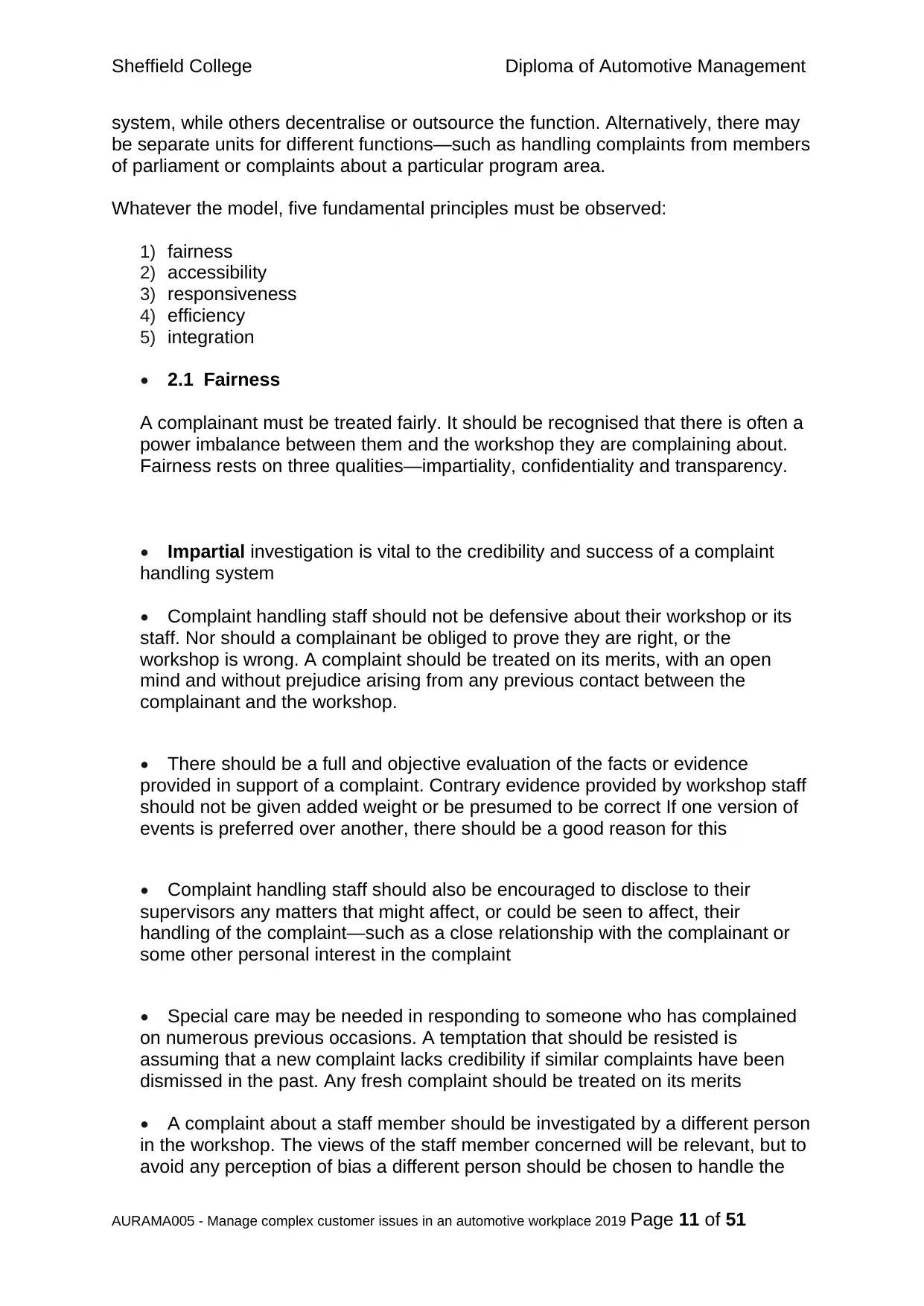
Sheffield College Diploma of Automotive Management
system, while others decentralise or outsource the function. Alternatively, there may
be separate units for different functions—such as handling complaints from members
of parliament or complaints about a particular program area.
Whatever the model, five fundamental principles must be observed:
1) fairness
2) accessibility
3) responsiveness
4) efficiency
5) integration
• 2.1 Fairness
A complainant must be treated fairly. It should be recognised that there is often a
power imbalance between them and the workshop they are complaining about.
Fairness rests on three qualities—impartiality, confidentiality and transparency.
• Impartial investigation is vital to the credibility and success of a complaint
handling system
• Complaint handling staff should not be defensive about their workshop or its
staff. Nor should a complainant be obliged to prove they are right, or the
workshop is wrong. A complaint should be treated on its merits, with an open
mind and without prejudice arising from any previous contact between the
complainant and the workshop.
• There should be a full and objective evaluation of the facts or evidence
provided in support of a complaint. Contrary evidence provided by workshop staff
should not be given added weight or be presumed to be correct If one version of
events is preferred over another, there should be a good reason for this
• Complaint handling staff should also be encouraged to disclose to their
supervisors any matters that might affect, or could be seen to affect, their
handling of the complaint—such as a close relationship with the complainant or
some other personal interest in the complaint
• Special care may be needed in responding to someone who has complained
on numerous previous occasions. A temptation that should be resisted is
assuming that a new complaint lacks credibility if similar complaints have been
dismissed in the past. Any fresh complaint should be treated on its merits
• A complaint about a staff member should be investigated by a different person
in the workshop. The views of the staff member concerned will be relevant, but to
avoid any perception of bias a different person should be chosen to handle the
AURAMA005 - Manage complex customer issues in an automotive workplace 2019 Page 11 of 51
system, while others decentralise or outsource the function. Alternatively, there may
be separate units for different functions—such as handling complaints from members
of parliament or complaints about a particular program area.
Whatever the model, five fundamental principles must be observed:
1) fairness
2) accessibility
3) responsiveness
4) efficiency
5) integration
• 2.1 Fairness
A complainant must be treated fairly. It should be recognised that there is often a
power imbalance between them and the workshop they are complaining about.
Fairness rests on three qualities—impartiality, confidentiality and transparency.
• Impartial investigation is vital to the credibility and success of a complaint
handling system
• Complaint handling staff should not be defensive about their workshop or its
staff. Nor should a complainant be obliged to prove they are right, or the
workshop is wrong. A complaint should be treated on its merits, with an open
mind and without prejudice arising from any previous contact between the
complainant and the workshop.
• There should be a full and objective evaluation of the facts or evidence
provided in support of a complaint. Contrary evidence provided by workshop staff
should not be given added weight or be presumed to be correct If one version of
events is preferred over another, there should be a good reason for this
• Complaint handling staff should also be encouraged to disclose to their
supervisors any matters that might affect, or could be seen to affect, their
handling of the complaint—such as a close relationship with the complainant or
some other personal interest in the complaint
• Special care may be needed in responding to someone who has complained
on numerous previous occasions. A temptation that should be resisted is
assuming that a new complaint lacks credibility if similar complaints have been
dismissed in the past. Any fresh complaint should be treated on its merits
• A complaint about a staff member should be investigated by a different person
in the workshop. The views of the staff member concerned will be relevant, but to
avoid any perception of bias a different person should be chosen to handle the
AURAMA005 - Manage complex customer issues in an automotive workplace 2019 Page 11 of 51
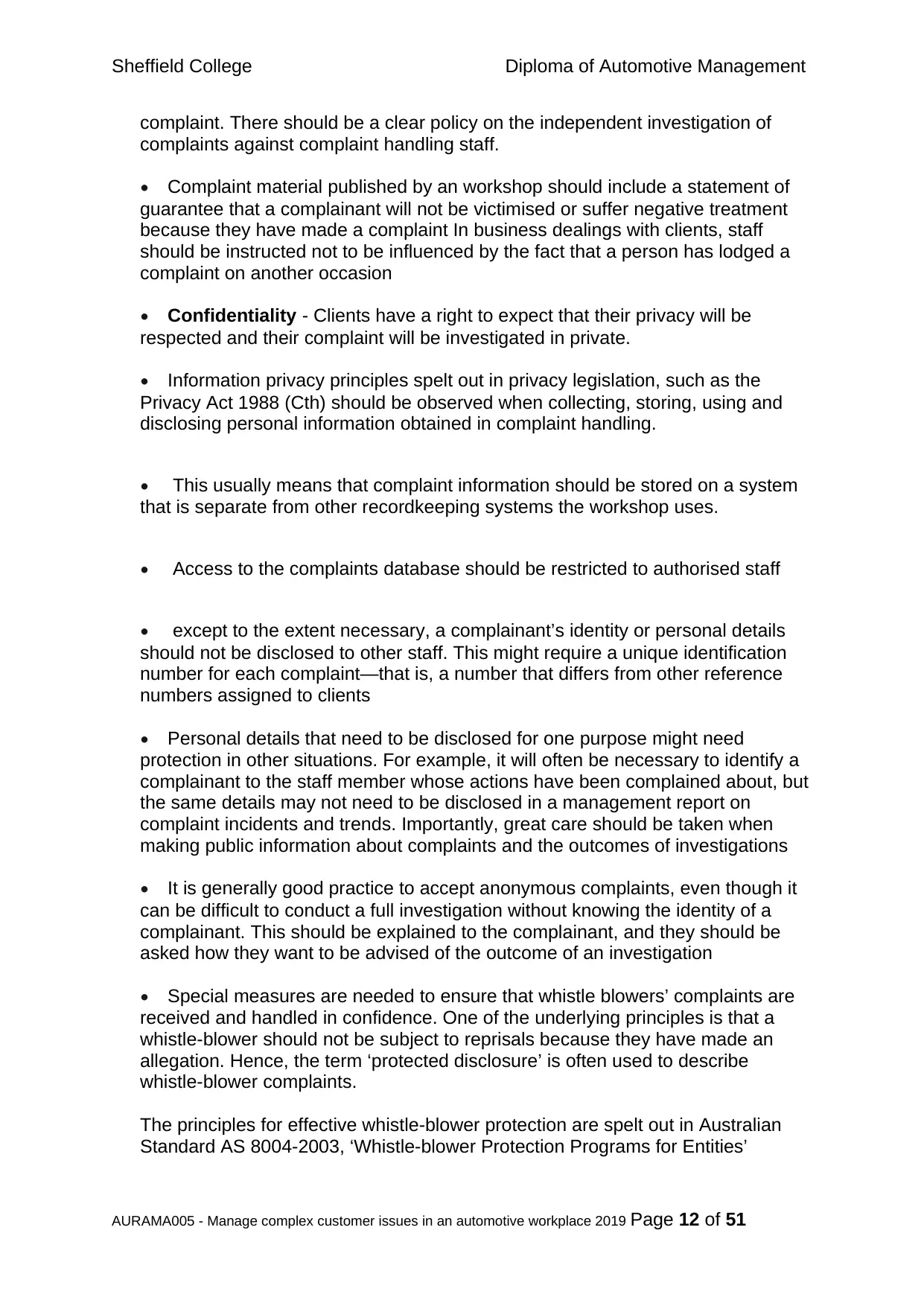
Sheffield College Diploma of Automotive Management
complaint. There should be a clear policy on the independent investigation of
complaints against complaint handling staff.
• Complaint material published by an workshop should include a statement of
guarantee that a complainant will not be victimised or suffer negative treatment
because they have made a complaint In business dealings with clients, staff
should be instructed not to be influenced by the fact that a person has lodged a
complaint on another occasion
• Confidentiality - Clients have a right to expect that their privacy will be
respected and their complaint will be investigated in private.
• Information privacy principles spelt out in privacy legislation, such as the
Privacy Act 1988 (Cth) should be observed when collecting, storing, using and
disclosing personal information obtained in complaint handling.
• This usually means that complaint information should be stored on a system
that is separate from other recordkeeping systems the workshop uses.
• Access to the complaints database should be restricted to authorised staff
• except to the extent necessary, a complainant’s identity or personal details
should not be disclosed to other staff. This might require a unique identification
number for each complaint—that is, a number that differs from other reference
numbers assigned to clients
• Personal details that need to be disclosed for one purpose might need
protection in other situations. For example, it will often be necessary to identify a
complainant to the staff member whose actions have been complained about, but
the same details may not need to be disclosed in a management report on
complaint incidents and trends. Importantly, great care should be taken when
making public information about complaints and the outcomes of investigations
• It is generally good practice to accept anonymous complaints, even though it
can be difficult to conduct a full investigation without knowing the identity of a
complainant. This should be explained to the complainant, and they should be
asked how they want to be advised of the outcome of an investigation
• Special measures are needed to ensure that whistle blowers’ complaints are
received and handled in confidence. One of the underlying principles is that a
whistle-blower should not be subject to reprisals because they have made an
allegation. Hence, the term ‘protected disclosure’ is often used to describe
whistle-blower complaints.
The principles for effective whistle-blower protection are spelt out in Australian
Standard AS 8004-2003, ‘Whistle-blower Protection Programs for Entities’
AURAMA005 - Manage complex customer issues in an automotive workplace 2019 Page 12 of 51
complaint. There should be a clear policy on the independent investigation of
complaints against complaint handling staff.
• Complaint material published by an workshop should include a statement of
guarantee that a complainant will not be victimised or suffer negative treatment
because they have made a complaint In business dealings with clients, staff
should be instructed not to be influenced by the fact that a person has lodged a
complaint on another occasion
• Confidentiality - Clients have a right to expect that their privacy will be
respected and their complaint will be investigated in private.
• Information privacy principles spelt out in privacy legislation, such as the
Privacy Act 1988 (Cth) should be observed when collecting, storing, using and
disclosing personal information obtained in complaint handling.
• This usually means that complaint information should be stored on a system
that is separate from other recordkeeping systems the workshop uses.
• Access to the complaints database should be restricted to authorised staff
• except to the extent necessary, a complainant’s identity or personal details
should not be disclosed to other staff. This might require a unique identification
number for each complaint—that is, a number that differs from other reference
numbers assigned to clients
• Personal details that need to be disclosed for one purpose might need
protection in other situations. For example, it will often be necessary to identify a
complainant to the staff member whose actions have been complained about, but
the same details may not need to be disclosed in a management report on
complaint incidents and trends. Importantly, great care should be taken when
making public information about complaints and the outcomes of investigations
• It is generally good practice to accept anonymous complaints, even though it
can be difficult to conduct a full investigation without knowing the identity of a
complainant. This should be explained to the complainant, and they should be
asked how they want to be advised of the outcome of an investigation
• Special measures are needed to ensure that whistle blowers’ complaints are
received and handled in confidence. One of the underlying principles is that a
whistle-blower should not be subject to reprisals because they have made an
allegation. Hence, the term ‘protected disclosure’ is often used to describe
whistle-blower complaints.
The principles for effective whistle-blower protection are spelt out in Australian
Standard AS 8004-2003, ‘Whistle-blower Protection Programs for Entities’
AURAMA005 - Manage complex customer issues in an automotive workplace 2019 Page 12 of 51
⊘ This is a preview!⊘
Do you want full access?
Subscribe today to unlock all pages.

Trusted by 1+ million students worldwide
1 out of 51
Related Documents
Your All-in-One AI-Powered Toolkit for Academic Success.
+13062052269
info@desklib.com
Available 24*7 on WhatsApp / Email
![[object Object]](/_next/static/media/star-bottom.7253800d.svg)
Unlock your academic potential
Copyright © 2020–2026 A2Z Services. All Rights Reserved. Developed and managed by ZUCOL.





